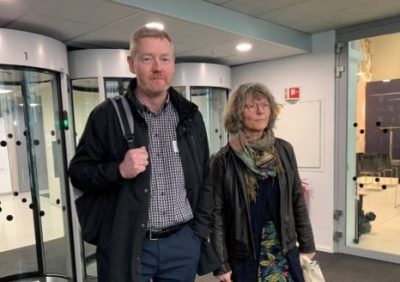Norway’s constantly complaining farmers have made a shocking demand for state subsidy and other support, but may be able to get it. The Labour-Center government made lots of promises to them during last year’s election campaign, and is now under pressure to deliver.

Leaders of the farmers’ two national lobby organizations strode into the agriculture ministry and handed over a demand for no less than NOK 11.5 billion (USD 1.3 billion) from the state, even though Norwegian taxpayers already face among the world’s highest food prices. Bjørn Gimming of Norges Bondelag and Kjersti Hoff of the Norsk Bonde- og Småbrukarlag both insist the state support is needed in order to keep farmers farming.
“The demand is an expression of the extremely serious economic situation within agriculture,” Gimming stated. “While the need for food production has risen, we’re in danger of seeing it reduced in Norway. This demand is what’s needed to compensate for extraordinary costs, raise farmers’ income and contribute to food security.”
Want compensation and raises
Hoff had the same message from her members, who mostly represent small family farms around the country. Many of them have inherited land and historic homes in scenic areas, but claim they can’t generate enough income from farming. Most have other jobs on the side.
Their demands include NOK 2.4 billion just in compensation for record high prices for diesel, electricity and fertilizer. Few other businesses can expect compensation from the state, but farmers do, not least after prices for animal feed and fertilizer have skyrocketed. They also want what amounts to big pay raises: They’re not happy with annual farm income that averages NOK 386,000 a year, even though many also earn salaries in other “day jobs.” They’re thus demanding an extra NOK 25,000 each to match “pay development” in other branches, plus NOK 100,000 to narrow what they claim is the pay gap between farmers and other workers.
The money would come in a combination of cash, subsidies and tariff protection that prevents cheaper imported tomatoes or celery, for example, from competing with Norwegian-grown tomatoes and celery. That explains why the price of a stalk of celery annually jumps from as low as NOK 12 for celery from Spain to more than NOK 30 for celery grown in Lier west of Oslo.
Viil Søyland, who’ll be leading the state administration’s negotiations with the farm organizations, was not smiling as she accepted the farmers’ demands. She wasn’t entirely surprised, however, nor was anyone else following months of protests and compaints from the farmers and their expectations for financial relief. Since the state is a major owner in profitable fertilizer company Yara, and is also raking in cash on high oil, gas and electricity prices, there’s a bigger likelihood that some of windfall may turned back over to those paying record high bills.
“We are in an extraordinary situation both nationally and internationally, and we have two years behind us that have been anything but normal,” Søyland told news bureau NTB.
Ironicially enough, Norwegian farmers actually did quite well in 2020, when growing conditions were good, borders were closed and Norwegians couldn’t defy Norway’s high food prices by driving over the border to shop in Sweden. Most everyone was also stuck at home, when a trip to the grocery store was a high point of the day, and that led to booming sales of milk, cheese, bread, vegetables and meat. Sales were so strong that dairy cooperative Tine paid out bonuses to employees. Norway’s institute for bioeconomics (Nibio) calculated that farmers’ income rose an average 9 percent.

Farmers didn’t stay satisfied for long and negotiations with the former Conservatives-led government broke down last year even though they were led by a minister from the rural-friendly Christian Democrats. Expectations are high this year, since the Center Party now has political control of the agriculture ministry and farmers are among its most important constituents. New agriculture minister Sandra Borch grew up on a farm herself and told Norwegian Broadcasting (NRK) last week that her first round of negotiations with farmers “will be my most important exam.”
Borch has already promised to cover “extra costs” that have developed this year and said she understands “the situation Norwegian agriculture is in.” She said during a recent visit to a farm in Agder that “we will contribute to economic security for Norwegian farmers.”
Whether it will amount to the full NOK 11.5 billion demanded is doubtful. The farmers, however, would pocket record support even if they settle for half of that. Søyland pointed out that it’s “still difficult to predict how costs and income will develop,” and she’s braced for “very demanding negotiations this year.” She added, though, that it will be “extra important to offer the best possible predictability for the framework for Norwegian food production over time.”
Others, including the leader of the Liberal Party’s youth organization in Oslo Hanna Lien-Mathisen, claims the state needs to stop “just throwing money into agriculture” without making some structural changes to make it more climate-friendly. She worries about food waste, and how Norwegian farmers sometimes end up dumping pork in Eastern Europe or freezing lamb in order to keep prices high in Norway.
The state is due to respond to the farmers’ demand by the middle of next week, with negotiations expected to be wrapped up by May 16. If the two sides don’t agree, the state’s offer will be sent to the Parliament for a vote.
newsinenglish.no/Nina Berglund

